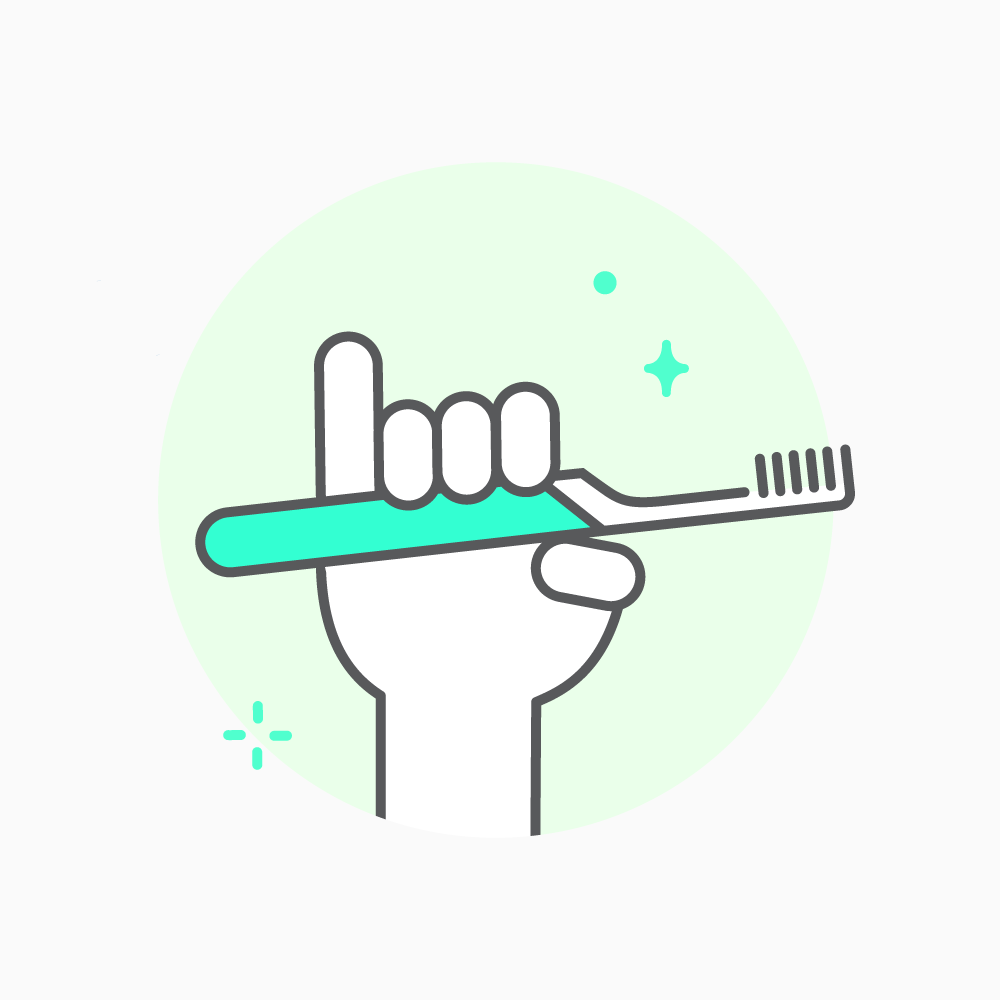Hard brusher? How to know. Why to stop
Share
We don't realize it, but the majority of us brush our teeth far too hard. We've been fooled into thinking that the harder we brush, the better we are cleaning, when it can in fact result in the opposite: permanent damage to your teeth and gums! We've seen first hand how common a problem this is from analyzing our member's bristles, so we created this quiz to help you recognize if you're a hard brusher and provide 5 tricks to help curb this damaging habit.
Why is hard brushing bad?
We aren’t sure if it comes from watching cartoons as a kid or commercials as an adult, but at some point we're led to believe that brushing teeth is about vigorously rubbing away “dirt”. Guess what — it isn’t. Your enamel is kept perfectly clean by rinsing with water, eating fibrous food, and gentle rubbing. The true reason for brushing is to get the thin bristles into tight spots between teeth and the gum line to remove particles that can cause plaque buildup (which doesn't require any force at all).
Brushing too hard erodes enamel. Enamel prevents bacteria from entering the tooth. When it erodes, the core of the tooth is left unprotected, leading to decay and cavities. Enamel can’t repair itself, so take care of it. The same is true for your gums. You've seen the images at the dentist — when gums start to fade away and reveal the roots? Well, it doesn’t take much to link hard bristles and brushing as a primary cause for this, and the damage is often irreversible! Take the below quiz and soak in the correct answers to help fight this bad habit.

Question 1: How do you hold your brush?
A) Firmly, like a hammer
B) Rigid, in my palm
C) Gently, in my fingertips
Answer: C) in fingertips!
Gripping your toothbrush too hard is a common cause of hard brushing. Try holding your brush gently with your fingertips like a paintbrush, or even better, use your non-dominate hand when brushing, to trick yourself into brush more gently.

Question 2: What do bristles look like at 3 months?
A) The same as day 1!
B) A bit gnarly, but not awful
C) Smashed up and splayed
Answer: A) same as day 1!
You can tell you're a hard brusher if your bristles get splayed and worn out after only 1–2 months. Soften up on your technique and sign up for a service like quip that will send you a fresh head when the bristles are worn out at 3 months.

Question 3: How do you brush with your brush?
A) Sweeping left to right
B) Short, tooth-size strokes
C) Circular motions
Answer: B) tooth size strokes
Rather than movie-style circular brushing or sweeping back and forth movements, brush using short, tooth sized strokes. Sawing your toothbrush back and forth across your mouth leads to faster and harder strokes, which can wear away your tooth enamel and lead to receded gums, and your mouth can't go back from there. Try using a gently vibrating brush as it can encourage softer, shorter stroke habits and allow you to concentrate more on each tooth.

Question 4: At what angle do you hold your brush?
A) Straight onto my teeth
B) At 45 degrees to gums
C) I don’t pay attention!
Answer: B) at 45 degrees
Brushing straight-on towards your teeth can be hard on your gum line, which can also cause receding gums. Consciously thinking about brushing at a 45-degree angle can help with softer brushing. Choose a slim electric toothbrush like quip to allow you to more easily hold and manipulate your brush to the right angle, which can often be difficult with a bulkier brush.

Question 5: What type of bristles do you use?
A) Multi-angle, colored
B) Hard / eco bristles
C) Soft, flat cut, simple
Answer: C) Soft, flat cut
Some brushes have extra bells and whistles that can hurt your teeth. Hard bristles do not help you clean better, but actually eat away at your gums and enamel. Angled bristles can sometimes wear unevenly over time and can add more pressure on some areas of your gums more than others, leading to painful brushing. Use an even layered, soft bristle brush head without extra frills for the best, safest and most wholesome clean.
This tip was inspired by Dr. Mark Burhenne
Learn about Mark at AskTheDentist.com

